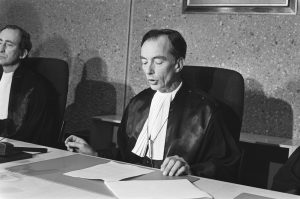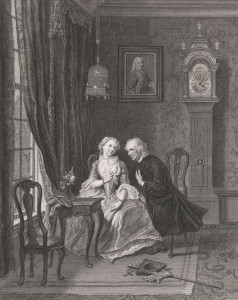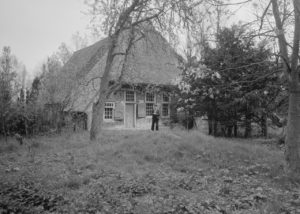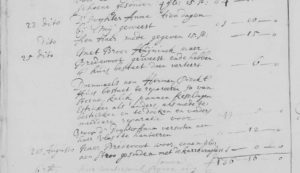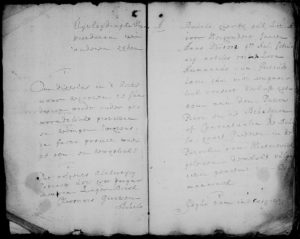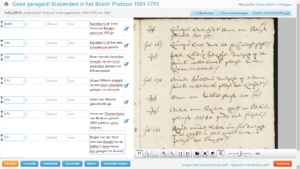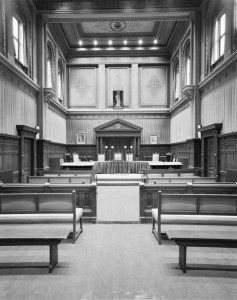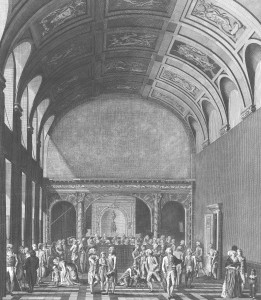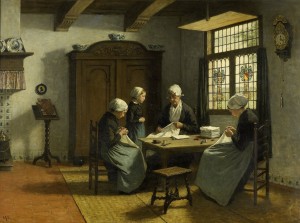A rechtszitting is a court session. The protocols of the sessions can have detailed information about the charges, defense, and witness statements. Court records can often be found in regional archives. Some archives have put indexes online. Check the Digital Resources Netherlands and Belgium website to find out which sources are online for the region you're looking for. … [Read more...]
Quick tip: Did your widowed ancestor make a settlement?
If a widow or widower with young children wanted to marry again, often they first had to make a settlement with their minor children so they received their share of the deceased parent's inheritance. These records can be helpful to prove family relationships, to get insights into the economic circumstances of the family, and to find out about subsequent marriages. These settlements can be found in orphan chamber records, voluntary court records, or notarial records, depending on the time and … [Read more...]
Quick tip – Find More Records via the FamilySearch Catalog
FamilySearch has many records from the Netherlands, available from the Netherlands Research Page. But that page only has the large record sets. FamilySearch is digitizing the microfilms in their granite mountain vault, and those images are sometimes available from the catalog only. Example: Lichtenvoorde court records Some of my ancestors are from Lichtenvoorde in the province of Gelderland. On the FamilySearch website, I can select Search > Catalog to search the catalog by place … [Read more...]
Dutch term – Huwelijkse voorwaarden
Huwelijkse voorwaarden (literally: marriage terms) is the Dutch term for prenuptial agreement. Historically, like today, most people did not have huwelijkse voorwaarden. Prenuptial agreements were often made by people who were well-to-do or who had children from a previous marriage to provide for. A prenuptial agreement identifies the spouses, sometimes accompanied by family members, and describes how the estate should be divided in case one of them dies. Usually, different scenarios are … [Read more...]
Quick tip – Your ancestors may appear in inventories
Estate inventories and guardians' accounts often contain information about the daily lives of our ancestors. They can tells us what they owned and whom they did business with. If your ancestor was in trade, he may appear in the inventories of some of his clients. This can give you more insight into his business. Depending on the time and place, you can find estate inventories and guardians' accounts in the voluntary court records, in orphan chamber records, or notarial records. Example: … [Read more...]
Quick tip – Deeds may have been recorded much later
In 1704, one of my ancestors had a dispute with his landlord. In the subsequent court case, both sides submitted copies of deeds into evidence. The oldest deed was from 1302, more than four centuries old at the time, allowing me to trace the history of that farm back more than seven hundred years. The original is now lost, the copy is all that remains. When searching for records, it pays off to expand your search, not just geographically but also in terms of the period you are searching. The … [Read more...]
The Bosch’ Protocol Crowdsourcing Project
442 years of records, spanning the period of 1367 to 1809. One of the most complete series of court records anywhere in the country. More than half of them in Latin. The Bosch' Protocols, the voluntary court records of the jurisdiction of 's-Hertogenbosch in Brabant, are a treasure trove of information. It has wills. It has deeds. It has prenups. It has stories about families from the entire region, since the jurisdiction of the city encompassed a large part of the former province of … [Read more...]
Dutch term – Vonnis
A vonnis is a verdict by a court. You can find vonnissen in court records, which are mostly not available online. … [Read more...]
Dutch term – Schepenbank
The schepenbank is the bench of aldermen, or the aldermen's court. The schepenen were the officials who set on the bench. The schepenbank would serve as the magistrate and as a court of law. The term Schepenbank was not used in all regions. Other terms include nedergerecht (Friesland) or vierschaar (Zeeland). Schepenbanken with higher jurisdiction were entitled to adjudicate all court cases, including capital cases. Schepenbanken with lower jurisdiction only adjudicated less severe cases. … [Read more...]
Source – Guardianship records
In my article about the Weeskamer (orphan chamber), an institute that oversaw the estates of orphans before 1811, several people asked me what records might exist for later orphans. The richest source of information are guardianship records, which can be found in the records of the court. Court-appointed guardians After 1811, the courts oversaw the appointing of guardians. If one parent died, the surviving parent automatically became the guardian, without the need for the court to interfere. … [Read more...]
